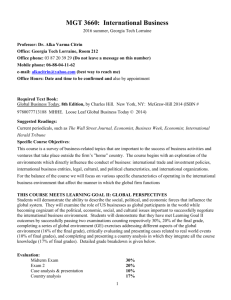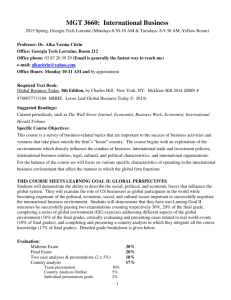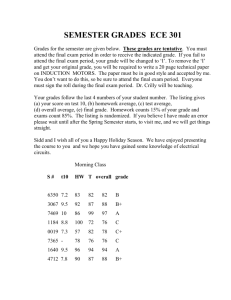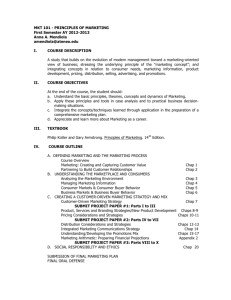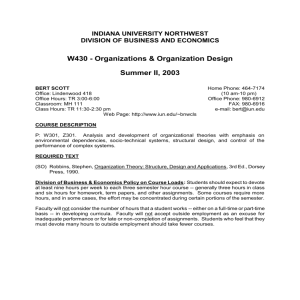International Business - Georgia Tech Lorraine
advertisement
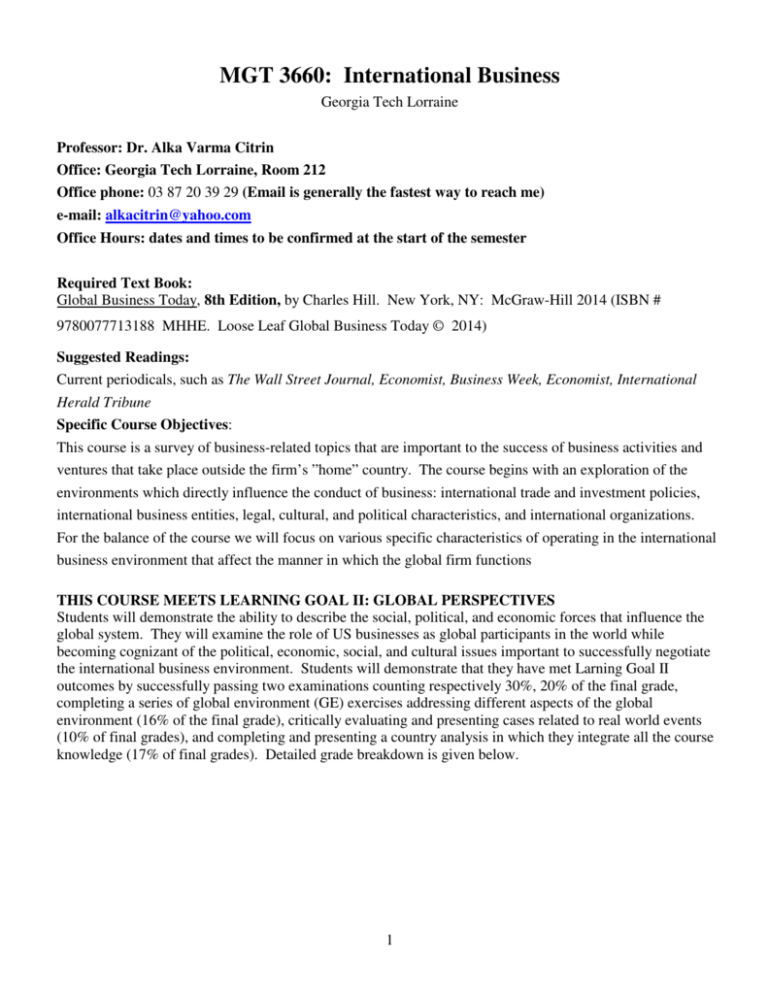
MGT 3660: International Business Georgia Tech Lorraine Professor: Dr. Alka Varma Citrin Office: Georgia Tech Lorraine, Room 212 Office phone: 03 87 20 39 29 (Email is generally the fastest way to reach me) e-mail: alkacitrin@yahoo.com Office Hours: dates and times to be confirmed at the start of the semester Required Text Book: Global Business Today, 8th Edition, by Charles Hill. New York, NY: McGraw-Hill 2014 (ISBN # 9780077713188 MHHE. Loose Leaf Global Business Today © 2014) Suggested Readings: Current periodicals, such as The Wall Street Journal, Economist, Business Week, Economist, International Herald Tribune Specific Course Objectives: This course is a survey of business-related topics that are important to the success of business activities and ventures that take place outside the firm’s ”home” country. The course begins with an exploration of the environments which directly influence the conduct of business: international trade and investment policies, international business entities, legal, cultural, and political characteristics, and international organizations. For the balance of the course we will focus on various specific characteristics of operating in the international business environment that affect the manner in which the global firm functions THIS COURSE MEETS LEARNING GOAL II: GLOBAL PERSPECTIVES Students will demonstrate the ability to describe the social, political, and economic forces that influence the global system. They will examine the role of US businesses as global participants in the world while becoming cognizant of the political, economic, social, and cultural issues important to successfully negotiate the international business environment. Students will demonstrate that they have met Larning Goal II outcomes by successfully passing two examinations counting respectively 30%, 20% of the final grade, completing a series of global environment (GE) exercises addressing different aspects of the global environment (16% of the final grade), critically evaluating and presenting cases related to real world events (10% of final grades), and completing and presenting a country analysis in which they integrate all the course knowledge (17% of final grades). Detailed grade breakdown is given below. 1 Evaluation: Exam 1 Exam 2 Two case analyses & presentations (2 x 5%) Country analysis Team presentation Country Analysis Outline Individual presentation grade 30% 20% 10% 17% 10% 5% 2% Global Edge Exercises (8 @ 2% each) 16% Group Evaluations 5% Attendance (Taken during scheduled case & 2% Project presentations) Total ……………………………… 100% Grading Scale: A = 90%-100% C = 70%-79.9 % F = Below 60% B = 80%-89.9% D = 60%-69.9% Note: I do not curve grades and course letter grades will be assigned on a straight percentage basis of total points earned. In general, put in your best effort for each assignment. There are no “extra credit” opportunities at the end of the semester to boost your grade up. Grade Appeals: If a student believes that the grade given on an assignment or an exam is not correct, s/he may appeal the grade by discussing it with the professor of the course within one week of the time the graded work is returned or posted. Every effort will be made to return graded assignments and exams in a timely manner. It is your responsibility to verify the accuracy of your grades and to bring to my notice any missing or incorrectly entered grades. Please do not wait till the end of the semester to claim credit for missing or incorrect grades. Examinations: There will be one mid-term exam and one final exam. Each exam will require approximately one hour and 30 minutes. The final examination date for this class is not yet scheduled so please do not plan any trips towards the end of the semester until you are sure of the exam date and time. - For exams you may not bring calculators, laptops, books, etc. - Examinations must be taken on the date scheduled and no makeup exams will be given later except in the case of university acceptable reason, or documented medical or family emergency. If, for some reason you must miss an exam (e.g., for a University related required absence which is documented) and are aware of the fact earlier, talk to me to arrange to take the exam prior to the exam date. A missed exam with no prior arrangement to take the exam at an earlier date (and without an acceptable documented reason for the absence) will be given a zero score. Groups: Students can self-select or be assigned to work in groups of approximately 4 students. The group must be formed by the end of the first week. These groups will be responsible for the following: - 8 global edge exercises (note: if you do not work with your group in class when it is scheduled, you may turn it in on your own by the due date but cannot get the grade earned by the other group members. 2 - 2 Case analysis, as well as case presentations on the dates that they are due. Country analysis project outline and presentation in class Global Edge Exercises (laptop/tablet device needed to access data sources online in class): completed exercises are due on the class day following the class day in which the exercise are scheduled on the syllabus. Each class day is filled with a lot of information, required readings, and activities that are selected to enhance your learning. Consequently, I expect you to be present and responsible for in class work, modified instructions, and other assignments which may be given. Towards this end, a number of in class activities are assigned to expose you to a range of data sources to help research information about different factors critical to successful international business operations. While some of them may appear simple, the goal is to help you identify sources to permit informed and critical evaluation of international market opportunities and threats, current state and potential of different global markets. The Global EDGE Resource Desk exercises assigned on the course schedule will expose you to the wealth of data available in evaluating and planning multiple aspects of international business strategies. You are required to complete a series of exercises with your group members. These exercises are marked on the syllabus with a notation, “GE” followed by the chapter number and exercise number (s) that you should complete. I will provide additional information that will be posted on T-square providing more guidance on where and how to access required data bases. We will go over this in class. I will assign time in class to complete or at least to begin working on these exercises. Please arrange for at least one group member who will be present in class to bring a laptop to class to access the online resources necessary to complete the Global EDGE exercises. A summary of your responses to the questions needs to be turned in to me as a group in the class following the class in which they are assigned. If you are unable to work with your group on the exercise in class, you cannot add your name to the submission and must complete it on your own to receive credit for completing it. Case write up and case presentation (group assignment) See list of cases and presentation dates on the last page of this syllabus: The group scheduled to present the case must turn in a two page typed report responding to the key questions related to the case at the start of the class period for which it is assigned. Please complete this assignment in a question and answer format by first providing the question being addressed and your response to that question. Make sure you turn in your responses to the assigned case questions . Your answers must be proofed for grammar, spelling, and understandability. Concise and thoughtful responses will earn higher grades compared to lengthy and unfocused answers. I look for insightful responses to the questions showing more than a regurgitation of stated facts. In addition, please ensure that you present an update on the current situation related to the case being analyzed. Grading will take into account ability to show enthusiasm while presenting, ability to maintain eye contact with audience instead of simply reading off flash cards or overheads, ability to engage audience and presentation structured in a logical, thoughtful, and precise fashion. Presentation of cases in class should not exceed 15 minutes. The case presentation should include a brief background of the facts in the case, an analysis of the main problem(s) and issue(s) using the questions answered as a guideline to structure your analysis, and an update on the current status of the situation described in the case. - Both the written and the oral presentation should discuss each case question by first presenting the question followed by an appropriate analysis and response to the question. - Ensure that you have thoroughly read and understood the terminology and concepts presented in the case corresponding book chapter to use the appropriate terminology and concepts in your presentation. 3 - Remember to do some secondary research to present current information to back up any assertions and recommendations you believe are relevant to the case. Each student in the group must play an active role in the presentation. Group members absent from the presentation either by virtue of a physical absence or not presenting will earn a zero for that portion of the grade. Specific grading criteria for these presentations will be provided to you. Presentation of Country Analysis: Students will also work in their groups to analyze a firm’s entry strategy into a specific country (by evaluating and contrasting two different countries) and will present the important issues considered for successful business operations and reasons for their choices. More details on this project will be provided in class. Groups will present their analysis in class on their assigned date. Every student in the group must be part of the presentation and make a contribution in terms of presenting beyond simply introducing group members. Students that do not present will forfeit the entire portion of their individual presentation grades. Group Evaluations: Since a significant portion of the work is in groups, it is critical that you work regularly and contribute your fair share to the group. You must complete and turn in a peer evaluation form that will be provided and evaluate each group member including yourself. You must turn in the group evaluation form by the date on which your group is scheduled to make the country analysis presentation in order to receive credit for that portion of the grade. The group evaluations will count towards your final grades and will be calculated by averaging each group member’s assessment of your contribution to that group’s work. If you need to be absent for any reason during the semester, make sure you let your group members know and make arrangements to do your fair share of the work. If you are facing difficulties working with your group, talk to me about this soon or try to resolve it by openly discussing issues with group members with the aim of finding a solution to make the group work. Excessive absences from class sessions or a poor group evaluation score (an average score of 3 or lower out of 5 points on an average from group members), can result in an overall grade reduction for the group projects portion Attendance: In general you are expected to attend class regularly. Attendance will be taken on the days GE work days, case presentation days and project presentation dates. Two attendance drops will be permitted so please reserve these for days you may be sick or have some GTl required reason to be absent. Additional absences due to personal trips, etc. will not be excused. Classroom Policies In general I hope that we can agree on some general guidelines for behavior for both professors and students to make this class a valuable learning experience for everyone. I will make every effort to come prepared for each class session and to respond to your questions fully and courteously. By the same token, I expect each student to attend each class session to the best of his/her ability and to come prepared with the assigned readings and assignments. Use of electronic media in the classroom should be limited to classroom related work. Student Honor Code/Academic Honesty: Adherence to the Student Honor Code is expected. The Academic Honor Code is explained in detail in the GIT General Catalogue or at http://www.deanofstudents.gatech.edu/Honor/. Any instance of suspected academic dishonesty (e.g., plagiarism; cheating on an examination) will be referred to the Office of the Dean of Students for disciplinary action. Please familiarize yourself with avoiding it now (for example, a guide for students at the University of Toronto is given at http://www.utoronto.ca/writing/plagsep.html and may be helpful to you in understanding what constitutes the offense). 4 Electronic Media Usage: Please desist from using the wireless/cellular services for non-course related communications or work. It is extremely distracting both for me as a teacher and for many of your cohorts when other students are clearly engaged in non-class related electronic media usage. You may use your laptops/tablets in class to follow lectures, take notes, make class related presentations as well as to work on assigned in class work. Policy on Late Assignments: If an assignment is turned in late it will be accepted for up to 5 university working days with a penalty of 20% of the assignment points taken off for each day that the assignment is late. After five working days, the assignment will not earn any credit. If you turn in a late assignment in any form except in person, it is your responsibility to check with me as soon as possible to ensure that I received it to ensure receiving appropriate credit. Classroom Behavior: If you need to arrive late or to leave early, please let me know and sit in an area, which will create the least amount of disruption when you arrive or leave. If you are absent from a class you are responsible for getting notes from classmates. Disability Resource Center Accommodations: Reasonable accommodations are available for students who have a documented disability. Please notify the instructor during the first week of class of any accommodations needed for the course. Late notification may cause the requested accommodations to be unavailable. 5 Tentative Course Schedule and Assignment Due Dates (subject to revision) Week Topic Reading/Assignment 1 Course introduction and National Differences Chap 1, Chap 2 Group Assignment 1 National Differences 2 Political Economies Chapter 2 Group Assignments Sign up for case presentations. Individual Information card due Group country choice discussions 3 Cultural differences 3 Business Ethics Case 1: Polish Surprise, pg. 56; GE1 Group country choice due Chap 4; Case 2: Japan’s Economic Malaise: pg. 85 Chaps 4 & 5, GE 2 Case 3: Culture & Business in Saudi Arabia: 4 International Trade Theory pg. 119 Chap 6 Case 4: Rise of Bangladesh’s Textile Trade, pg. 182 5 Politics of International Trade Chap 7 GE3; Case 5: US Tariffs on Tire Imports from China, pg. 215 6 Foreign Direct Investment Chapter 8 GE4; Case 6: Walmart in Japan, pg. 245 7 Regional Economic Integration 7 Foreign exchange and Intl Monetary Policy Chap 9 Case7:NAFTA & Mexican Trucking, pg. 277 Chaps 10 & 11 6 Week 8 Topic Foreign exchange and Intl Monetary Policy Reading/Assignment Chaps 10 & 11 (Group Eval 1 due) GE5 (Case 8:Economic Turmoil in Latvia, pg. 331 9 International Bus. Strategy Chap 12 Case 9: Avon Products, pg. 364 9 Exam 1 10 Foreign Market Entry Chapters 1-11 Chap 13 Case 10: General Motors in China, pg. 387 Work on final project 11 Exporting, Importing, Countertrade 12 Global Production& Outsourcing Chap 14 GE6; Case 11: Vellus Products, Pg. 409) Chap 15 GE 7; Case 12: The Rise of the Indian Automobile Industry, pg. 433 13 Global Marketing & R&D Chap 16, GE 8 Case 13: Domino’s Pizza, pg. 465 Project outline draft due 13 Exam 2 14 14 Final Project Presentations Final Project Presentations (Group Eval 2 Due) 7 Case # Page number Case Name Questions Case 1 56-57 Polish Surprise 1-4 Case 2 85-86 Japan’s Economic Malaise 1-4 Case 3 119-120 Culture and Business in Saudi Arabia 1-3 Case 4 182-183 Rise of Bangladesh’s Textile Trade 1-4 Case 5 215-216 US Tariffs on Tire Imports from China 1-4 Case 6 245-246 Walmart in Japan 1-4 Case 7 277-278 NAFTA and Mexican Trucking 1-4 Case 8 331 Economic Turmoil in Latvia 1-4 Case 9 364-365 Avon Products 1-4 Case 10 387-388 General Motors in China 1-4 Case 11 409 Vellus Products 1-4 Case 12 433-434 The Rise of the Indian Automobile Industry 1-4 Case 13 465 Domino’s Pizza 1-4 8
